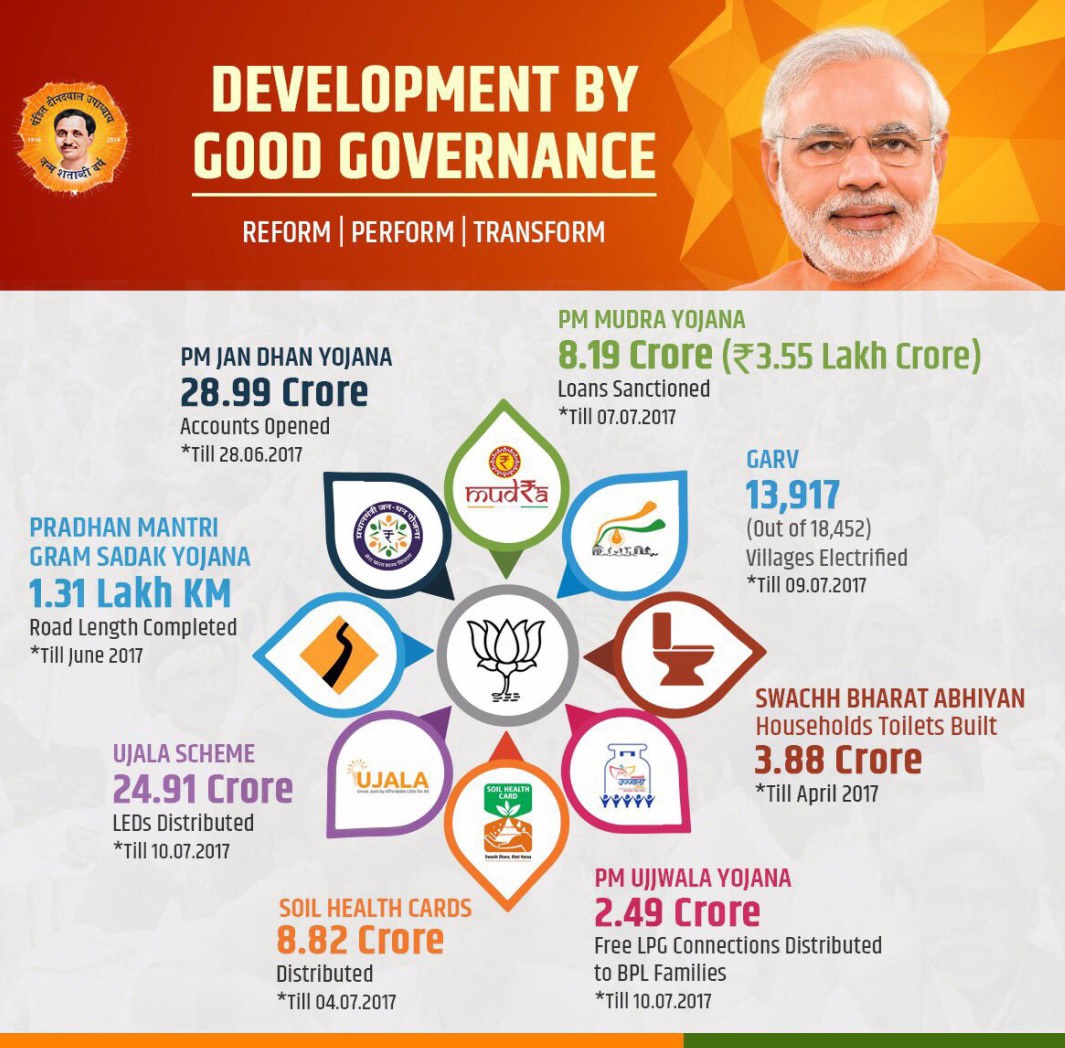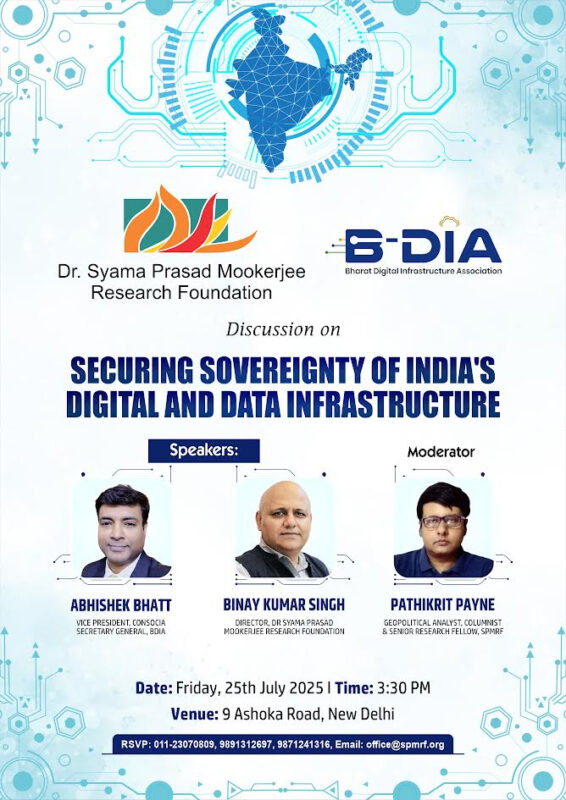Innovation has been a key differentiator in many sectors with technology playing a vital role in its fulfillment. Bringing technology into governance there by bringing transparency and efficiency has always been passion of our Prime Minister Narendra Modi. We can see how some of the initiatives over the past 7 years have played in this regard. Some of these are breakthrough in many ways setting a global benchmark on digital governance and E-Gov initiatives.
PM Narendra Modi during his first term envisioned Digital Financial Inclusion with an aim of achieving Universal access to financial services making use of new and transformative technology and business models and had an ambition to reaching the unreached.
With over 500 million Bank accounts being opened through PM Jan Dhan Yojna the number itself has been World’s Largest Financial Inclusion Program ever achieved in record time.
Digital Platforms such as Aadhaar, UPI and Cowin have been built at Planet Scale to provide various services helping deliver lot of services to citizens.
Direct Benefits transfer, and government initiative to provide fiscal incentive to deserving citizens has been made more transparent and efficient because of Jan Dhan Accounts, Mobile and Aadhar making the welfare across the country possible without distribution losses.
This has been in LPG Subsidy through PAHAL Scheme to Public distribution system (PDS) to Mid-Day Meals to National Social Assistance Program (NSAP), Scholarships to Students (GATE and other Research Fellowships like PMRF), Rural Employment through MNREGA these programs are either to direct beneficiary or through State and Central Government departments.
Also, Supercomputing and Quantum Computing research has not only made India a pioneer in the field but also ready for Industrial Revolution 5.0. There has been a plan to spend over 25 Lakh Cr over the next 5 years on Agricultural sector and much of the investment will be driven with analytics derived from Big Data and AI.
There has been exploration for Use of blockchain, AI, IoT to enable agriculture sector to make it adoptable to emerging technology. This has been in line with the vision of Prime Minister to double farmer’s income in the next 5 years by giving them technology and market access. There also has been a kisan Suvidha App with development of Mkisan Portal for crop related matters.
Modi Government has also enabled space technologies for forecasting weather, forecasting agricultural output, geospatial mapping, draught assessment, geotagging for mapping and application of drones for monitoring situation in flood, draught, and crop insurance.
With Prime Minister Modi’s efforts India and Japan recently have launched 187 mn USD (1,374.3 Cr INR) fund to invest in over 100 deep-tech startups. This Venture fund is to focus on startups related to AI and IoT. Of the total amount, 15 billion Japanese Yen or 140 million USD will be raised from Japanese investors while the remaining will be raised from Indian investors.
Recently Modi Government has approved the launch of National Mission on Interdisciplinary Cyber-Physical Systems (NM-ICPS) to be implemented by the Department of Science & Technology (DST) with a total outlay of Rs. 3660 Crore for a period of five years. This Mission aims to create a strong foundation and a seamless ecosystem for CPS technologies by coordinating and integrating nationwide efforts encompassing knowledge generation, human resource development, research, technology and product development, innovation, and commercialization.
The mission will be implemented through a network of 15 Technology Innovation Hubs (TIHs), 6 Sectoral Application Hubs (SAHs) and 4 Technology Translation Research Parks (TTRPs). Each hub and technology parks will follow a technology life cycle approach. This initiative is supposed to give a necessary boost required on areas such as Artificial intelligence, Technologies for Internet of Things and Everything (IOT & IOE), Sensors, Activators and Control, Databanks & Data Services, Data Analytics, Advanced Communication Systems (5G, 6G and beyond), Robotics & Autonomous Systems (Self Driving Cars, Drones), Cyber Security and Cyber Security for Physical Infrastructure.
PM Narendra Modi has made the formation of Indian National Space Promotion and Authorization Centre
Which is seeking to open space infrastructure to the private sector. Union Cabinet led by the PM Modi have taken the historic decision in June 2020 for opening the Space sector and thereby enabling participation of the Indian private sector in the entire sector of aeronautics and space technologies. These proposals are pertaining to a vast range of activities including satellite constellation, small satellite launch vehicles, ground station, geospatial services, propulsion systems and application products.
The decision to reform India’s prospects and potential in the Space sector has heralded a new era of public-private partnership in this space technologies sector. Prime Minister Modi also has taken active interest in making companies encourage to make rockets and satellites and he has assured them complete and wholehearted support from the government. The PM has said that the Private investment in the sector will lead to the creation of hi-tech jobs, which will provide employment and host of opportunities to the talent pool in Eminent institutions such as Indian Institute of Technology (IIT), National Institute of Technology (NIT) and other technical institutions.
Thus, in the past 7 years active efforts of Prime Minister Modi and BJP led NDA Government has shown great interest in boosting technology and scientific research in India. It has also helped creation of innovation and entrepreneurial ecosystem for private-equity investment in sectors such as Deep-tech in AI, IoT, Blockchain, Machine Learning and Space Technologies. It has also made India ready for next generation of industrial revolution. There has also been lot of efforts done on upskilling the talent.
(The author is BE, MTech (Comp Sci, MIT, Manipal) Technologist having interest in public policy, foreign policy, economics & startup ecosystem)
(This article has been published in the Issue 92 August 2021 – Economic Newspaper, BJP Karnataka Economic Cell)
(The views expressed are the author's own and do not necessarily reflect the position of the organisation)


